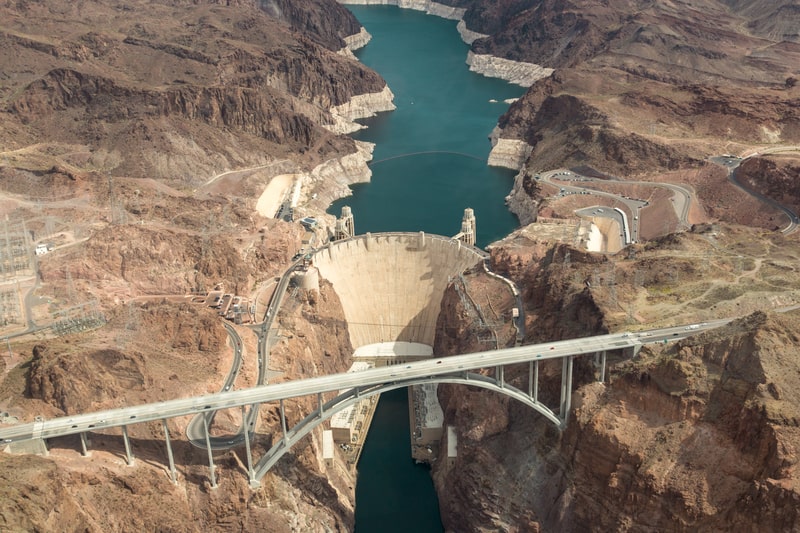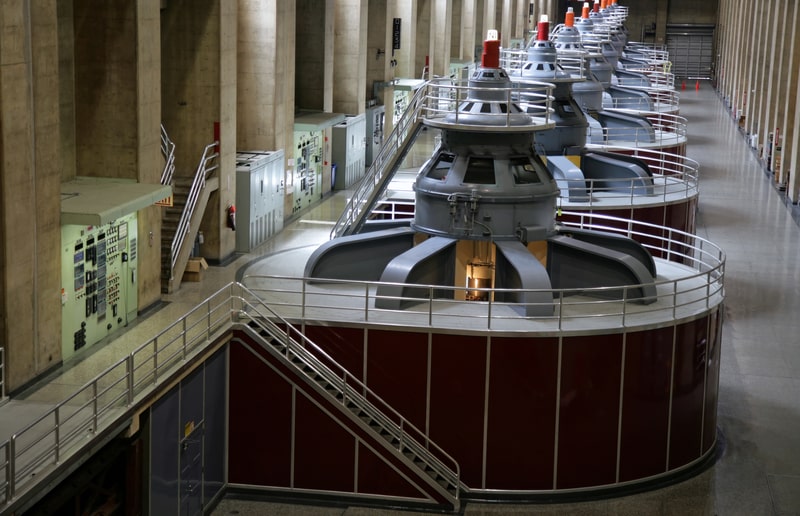Last updated on November 15th, 2022
36. Making the Desert Bloom
The monumental project claimed 96 lives. They included surveyors, electricians, and other workers (classified as “industrial fatalities”). A memorial on the site honors their sacrifices “to make the desert bloom.”
37. Star Map Floor
The memorial has a star map floor depicting the sky of the Northern Hemisphere at the moment President Roosevelt dedicated the dam. It is a functional map. Future astronomers can use it to calculate the date of his speech.
38. Bronze Sculptures
Oskar J. W. Hansen made 30ft-high bronze sculptures called “Winged Figures of the Republic.” Transport was tricky. They placed the artwork on ice to prevent scratches and guided them to position as they melted.
39. Artistic Themes
On the Nevada side, a bas-relief depicts the benefits of the dam: irrigation, navigation, water storage, power generation, and flood control. On the Arizona side, a similar artwork shows Indian tribes inhabiting plains and mountains.
40. Hoover Dam Bypass Project

Nevada to Arizona? Before, you could drive atop the dam to cross state lines and enjoy the views. However, the September 11 attacks made it a security risk. Tourists also slow down the flow of traffic. Authorities built an alternative road nearby: the Hoover Dam Bypass.
Operation and Benefits
41. Power Generation Capacity
When Thomas Edison surveyed the site in 1902, he thought he could generate 7,500 kilowatts of power. Thanks to current technologies, the Hoover Dam vastly exceeded the estimate with a maximum capacity of 2,080,000 kilowatts!
42. Bombproof Powerhouse Roof
Sabotage and explosives? Not a problem. The designers already thought of that. The Hoover Dam has a bombproof powerhouse roof to shrug these off, with over a meter of concrete, steel, rock, and tar for protection.
43. Minimum Power Pool Elevation
Water level dictates power production. If you want 100% capacity, you need to fill the dam. On the other end, the original design stopped generating power at 1,050 feet. This cut-off dropped to 950 feet thanks to more efficient turbines.
44. A Self-sustaining Dam

A public burden? Not at all! The Hoover Dam is costly, but it is not draining public funds. Power generation made it profitable, paying for its 50-year construction loan and continuous maintenance.
45. Irrigation
Hoover Dam provides drinking water for over 40 million people across California, Arizona, and Nevada. Its water also irrigates more than a million acres of land. It helps farms stay productive and keeps the economy vibrant.
46. Fighting Drought
The Colorado River is drying up, and the US government is trying to save it. Authorities plan to restrict water releases from the Hoover Dam to maintain its ability to generate power. However, the stakeholders must agree on the path forward.
47. Spillways
Overflows? The spillways take care of those! Two of them run along the canyon walls and go down to diversion tunnels that empty into the river. Each has a tremendous capacity of 200,000 cubic feet per second.
48. Tourism
Curious about the Hoover Dam? Take a tour. It opened its doors in 1937, allowing people to go around the visitor center, the power plant area, or the whole facility. Guides are available to tell you about the place and answer your questions. Almost a million tourists drop by every year.
49. Historic Landmark
The Hoover Dam was the largest project of its kind in the 1930s. In 1984, it got recognition as a National Historic Civil Engineering Landmark. It is right up there with the iconic Golden Gate Bridge and the Statue of Liberty.
50. Famous Customers
The water released by the Hoover Dam travels hundreds of miles to its final destination. You can thank it for the tap water the next time you visit SeaWorld in San Diego, Disneyland in Anaheim, or other public places in these areas.
Hoover dam – quick facts and statistics
| Official name | Hoover dam |
|---|---|
| Coordinates | 36°0′56″N 114°44′16″W |
| Type of dam | concrete gravity-arch dam |
| Located | Clark County, Nevada/Mohave County, Arizona, U.S |
| Status | operational |
| Purpose | power, flood control, water storage, regulation, recreation |
| Opened | 1936 |
| Owned by | United States government |
| Operated by | U.S. Bureau of Reclamation |
| Impounds | Colorado River |
| Reservoir | Lake Mead (the largest reservoir in the US in terms of water capacity) |
| Height | 726.4 ft (221.4 m) |
| Length | 1,244 ft (379 m) |
| Volume | 3,250,000 cu yd (2,480,000 m3) |
| Built by | Six Companies, Inc. (structural), Gordon Kaufmann (exteriors) |
| Cost | $49 million |
| Weight | more than 6,600,000 tons. |
| Maximum water pressure at the base of the dam | 45,000 pounds per square foot. |
| How many men were employed during the dam's construction? | 21,000 |
| Hydroelectricity generated | about 4 billion kilowatt-hours of hydroelectric power each year |
| Number of turbines installled | 17 |
| Installed capacity | 2,080 MW |
| Visitors | 7 million tourists each year (according to the NPS) |
| Last updated | November 06, 2022 |
